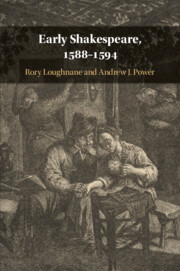Book contents
- Early Shakespeare, 1588–1594
- Early Shakespeare, 1588–1594
- Copyright page
- Contents
- Tables
- Notes on Contributors
- Acknowledgements
- Abbreviations
- Introduction Beginning with Shakespeare
- Chapter 1 Shakespeare and the Idea of Early Authorship
- Chapter 2 Collaboration and Shakespeare’s Early Career
- Chapter 3 The Language and Style of Early Shakespeare
- Chapter 4 Shakespeare’s Early Verse Style
- Chapter 5 Early Shakespeare, Chaucer, and Narrative Theory:
- Chapter 6 Poetry, Counsel, and Coercion in Shakespeare’s Early History Plays
- Chapter 7 John Lyly and Shakespeare’s Early Career
- Chapter 8 Spenser and Shakespeare: Bards of a Feather?
- Chapter 9 Arden of Faversham, Richard Burbage, and the Early Shakespeare Canon
- Chapter 10 Boy Parts in Early Shakespeare
- Chapter 11 The Origins of Richard Duke of York
- Chapter 12 Early Shakespeare and the Authorship of The Taming of the Shrew
- Chapter 13 Who Read What When?
- Book part
- Select Bibliography
- Index
Chapter 6 - Poetry, Counsel, and Coercion in Shakespeare’s Early History Plays
Published online by Cambridge University Press: 17 April 2020
- Early Shakespeare, 1588–1594
- Early Shakespeare, 1588–1594
- Copyright page
- Contents
- Tables
- Notes on Contributors
- Acknowledgements
- Abbreviations
- Introduction Beginning with Shakespeare
- Chapter 1 Shakespeare and the Idea of Early Authorship
- Chapter 2 Collaboration and Shakespeare’s Early Career
- Chapter 3 The Language and Style of Early Shakespeare
- Chapter 4 Shakespeare’s Early Verse Style
- Chapter 5 Early Shakespeare, Chaucer, and Narrative Theory:
- Chapter 6 Poetry, Counsel, and Coercion in Shakespeare’s Early History Plays
- Chapter 7 John Lyly and Shakespeare’s Early Career
- Chapter 8 Spenser and Shakespeare: Bards of a Feather?
- Chapter 9 Arden of Faversham, Richard Burbage, and the Early Shakespeare Canon
- Chapter 10 Boy Parts in Early Shakespeare
- Chapter 11 The Origins of Richard Duke of York
- Chapter 12 Early Shakespeare and the Authorship of The Taming of the Shrew
- Chapter 13 Who Read What When?
- Book part
- Select Bibliography
- Index
Summary
This chapter explores how the conciliar and coercive discourses of Renaissance historiography and lyric poetry intersect in Shakespeare’s early history plays. It focuses on scenes of textual composition, and other engagements with the construction and interpretation of literary language, in plays including Edward III, Arden of Faversham, Richard III, The First Part of the Contention, and Titus Andronicus, to show how they illuminate the uneasy overlap between political advice and gendered, sexual coercion during Elizabeth I’s reign. The plays’ treatment of the coercive properties of poetry cast monarch and subject in fluid, shifting roles, and highlight the awkward ethical implications of mobile rhetorical authority, ultimately troubling the distinction between good and bad political advice. Moreover, the chapter considers the centrality of collaboration to the production of meaning, not just between actors, printers, and playwrights, but also of genres and discourses, within this intensely self-referential cluster of Shakespeare’s co-authored early works.
- Type
- Chapter
- Information
- Early Shakespeare, 1588–1594 , pp. 147 - 166Publisher: Cambridge University PressPrint publication year: 2020



